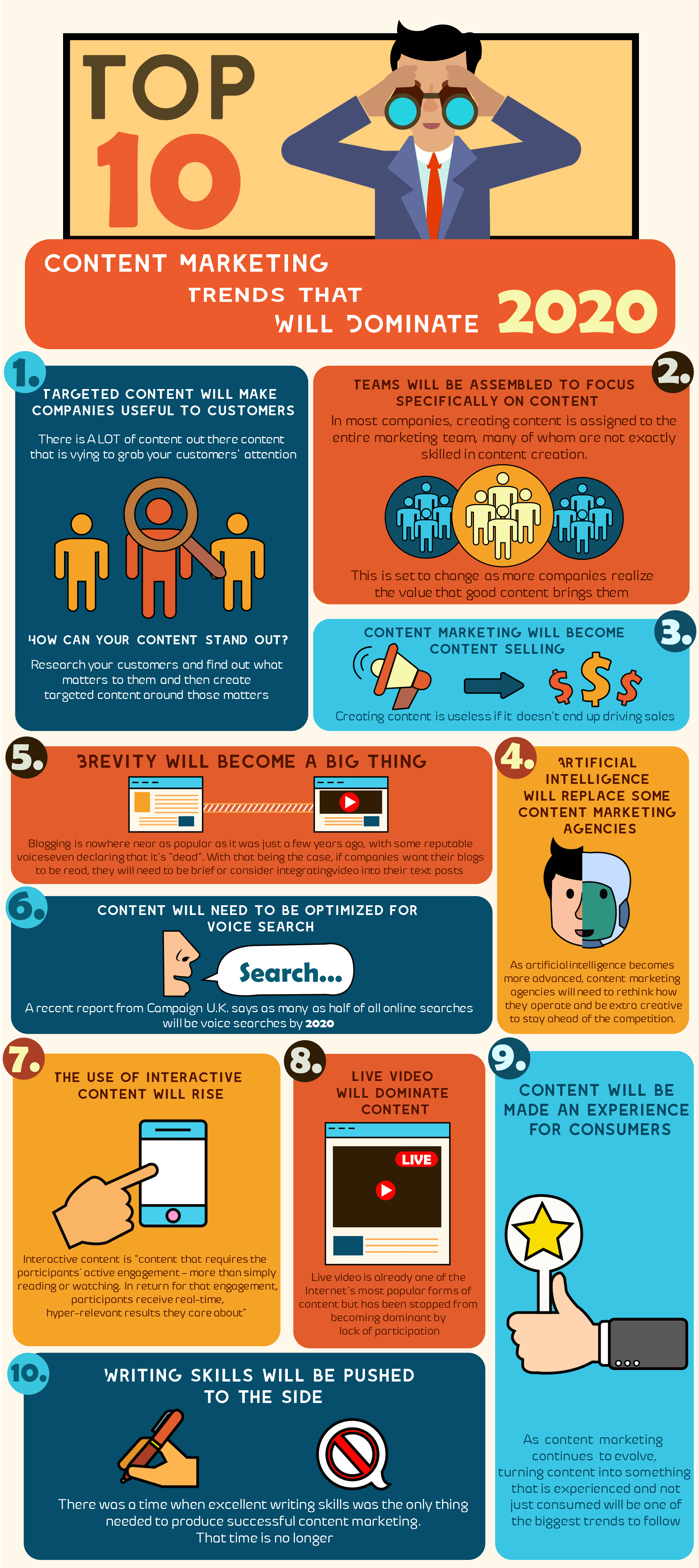Amid marketing’s ongoing evolution, the element of content has quickly become a crucial part of an organization’s marketing strategy. The Content Marketing Institute (CMI) defines content marketing as “a strategic marketing approach focused on creating and distributing valuable, relevant, and consistent content to attract and retain a clearly-defined audience — and, ultimately, to drive profitable customer action.”
According to research from Omar Akhtar, a digital marketing analyst at Altimeter Group, 2018 was the first year where changes in content marketing were truly significant. He writes: “Companies are now using content to do more than create awareness or brand health. They’re using it to directly drive revenue, become more cost-efficient and personalize the customer experience. Which is to say, they’re using content marketing to do far more than marketing.”
Content marketing comes in many forms such as blogs, newsletters, videos, podcasts, infographics, and whitepapers, and it is one of the most creative and effective tools in marketing. You can best believe that it won’t be going away any time soon. With another year fast approaching, it is time to start analyzing what things went right in content marketing in 2019, what things didn’t work out so well, what things surprised us and what things we can expect in the months to come. Keeping up with the latest trends in this field is one way to determine which form is most effective for certain campaigns and specific seasons.
List of Upcoming Content Marketing Trends in 2020
1. Targeted content will make companies useful to customers:
There is A LOT of content out there – content that is vying to grab your customers’ attention. How can your content stand out? How can you get customers to choose your content over other company’s content? By making it useful. Research your customers and find out what matters to them and then create targeted content around those matters. The consumer products company, Unilever, did this with their online video channel, All Things Hair. In an Upwork blog post, Brenda Do writes that Unilever partnered with Google to analyze over 11 billion global annual searches related to salon styling and hair care. From these analyses, they then were able to create targeted content for their video channels.
2. Teams will be assembled to focus specifically on content:
In most companies, creating content is assigned to the entire marketing team, many of whom are not exactly skilled in content creation. This is set to change as more companies realize the value that good content brings them. Robert Rose of The Content Marketing Institute says successful businesses now have teams focused on strategic content in marketing and communications. These specialized content creation teams are being treated as an important part of marketing departments, with many setting aside budgets for them. “Sixty-seven percent of B2B organizations are fully committed to the practice of content marketing,” Rose writes, “and half these organizations expect budgets to increase over the next year.”
3. Content marketing will become content selling:
Creating content is useless if it doesn’t end up driving sales. Skyler Moss, director of digital marketing, HCSS, says: “Traditional marketing teams and content are already going away, and the lines between sales and marketing will blur until both of those become one. By 2022, content marketing will really be ‘content selling’. If your content isn’t driving sales, then why are you creating it?”
(Also Read: Benefits of Content Marketing and Its Challenges)
4. Artificial intelligence will replace some content marketing agencies:
Arment Dietrich CEO, Gini Dietrich, shares of how a U.K. company started using Albert, an AI-based marketing platform, for its search engine marketing. The platform did so well that the company eventually let their content marketing agency go. As artificial intelligence becomes more advanced, content marketing agencies will need to rethink how they operate and be extra creative to stay ahead of the competition.
5. Brevity will become a big thing:
Blogging is nowhere near as popular as it was just a few years ago, with some reputable voices even declaring that it’s “dead”. With that being the case, if companies want their blogs to be read, they will need to be brief or consider integrating video into their text posts. Heinz Marketing president, Matt Heinz, says: “Blogs won’t be nearly as big as they are today. Google’s algorithm will increasingly value real-time and short-form content such that content producers will follow suit.”
6. Content will need to be optimized for voice search:
A recent report from Campaign U.K. says as many as half of all online searches will be voice searches by 2020. This means that companies will need to start optimizing a lot of their content for voice search. To make sure that your content is the one that voice assistants will recommend, Lilach Bullock of Forbes writes, “One of the most important aspects is that you need to get your content to be the featured snippet … and know which searches result in featured snippets.”
7. The use of interactive content will rise:
Interactive content is “content that requires the participants’ active engagement — more than simply reading or watching. In return for that engagement, participants receive real-time, hyper-relevant results they care about” (SnapApp). This includes such things as AR lenses, quizzes and surveys, games, animation, and sweepstakes that can help companies reach a wider audience. For example, Taco Bell’s Cinco de Mayo Snapchat Lens generated an impressive 224 million views.
8. Live video will dominate the content:
Live video is already one of the Internet’s most popular forms of content but has been stopped from becoming dominant by lack of participation. Jayson DeMers, however, predicts that by 2020 “live video will stabilize as an available means of communication”. Additionally, DeMers believes that live video will be in higher demand and in more places – including search results – within the coming year.
9. Content will be made an experience for consumers:
The 2018 Digital Trends report from Econsultancy and Adobe revealed that delivering personalized experiences in real-time is the most exciting opportunity for digital and marketing professionals. As content marketing continues to evolve, turning content into something that is experienced and not just consumed will be one of the biggest content marketing trends to follow. Caitlin Burgess writes on TopRank Marketing that “to deliver a tailored experience you’ll need to embrace proven and emerging marketing technologies such as those driven by AI and machine learning that can help enable personalization and enhance experiences.”
10. Writing skills will be pushed to the side:
There was a time when excellent writing skills were the only thing needed to produce successful content marketing. That time is no longer. Don’t get us wrong. Excellent writing will always be in demand and written content will continue to play a vital role in marketing. “New formats,” Kevin Payne writes, “like video and infographics now require content marketers to develop additional skill sets like video and audio production and graphic design.”
2020 will be an exciting year for content marketing. There are so many trends that are predicted to dominate in the coming months and the ones have given above are just a few of them.
Whichever trends you decide to follow and implement, you need to be sure to have a content marketing strategy in place that will keep you and your company on track in this ever-changing world.











